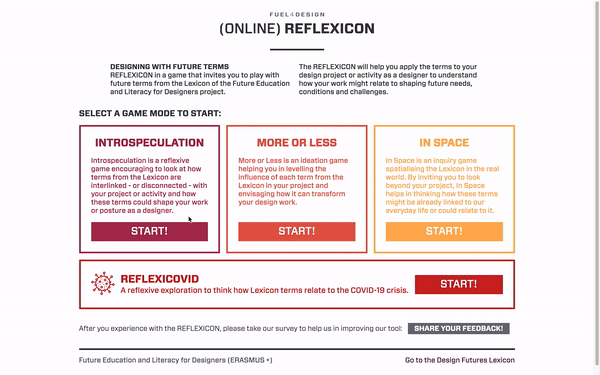
A gif of the REFLEXICON digital interactive tool
Designing with futures terms
REFLEXICON builds on the Lexicon of the Future Education and Literacy for Designers, and invites designers to play with future terms. It uses game play as a way to support designers on use and application of Futures Design terms and reflect on how their design project or activity work might relate to shaping future needs, conditions and challenges.
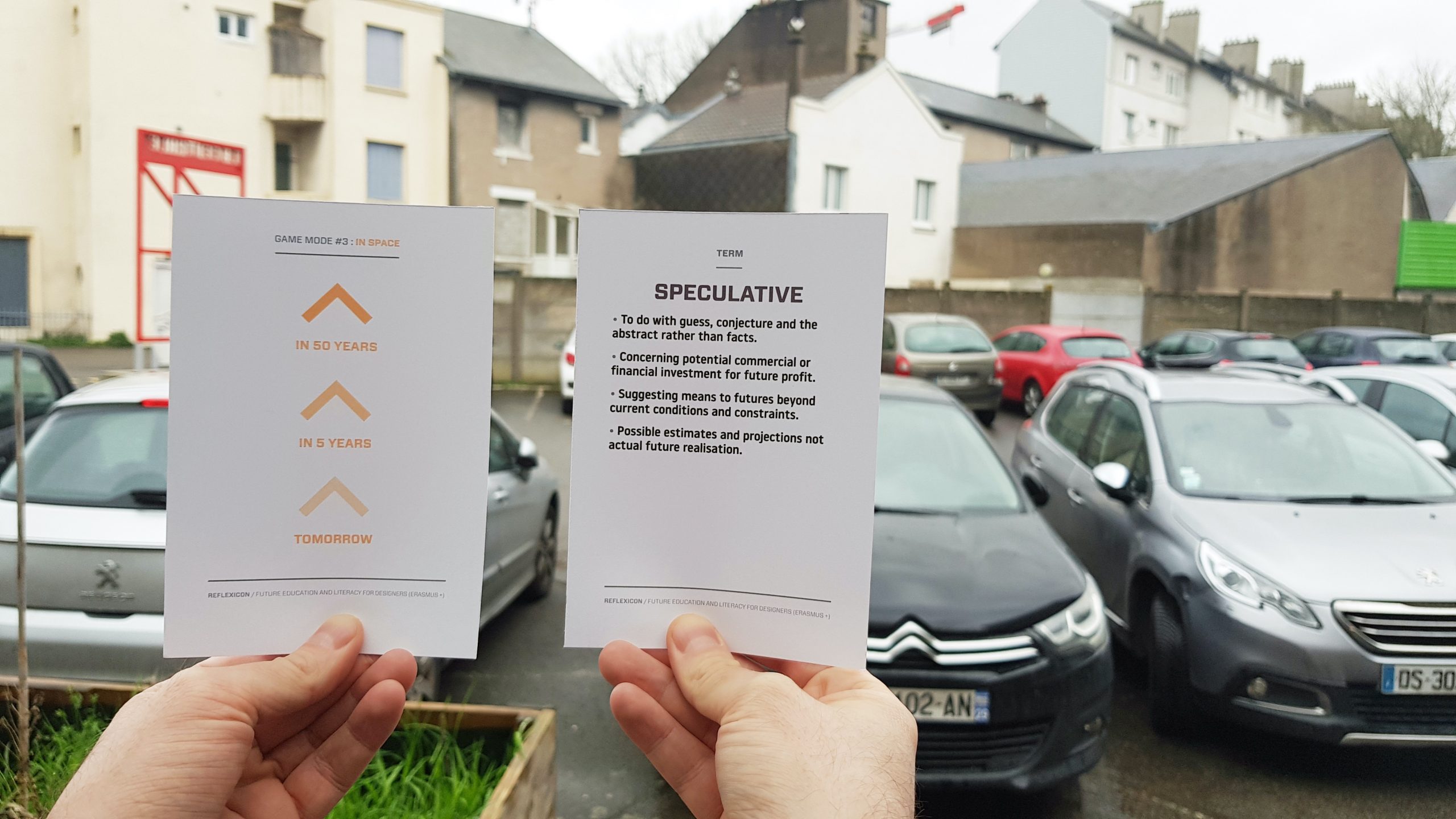
The card based REFLEXICON game. Photo Bastien Kerspern
As the unit 7.2 REFLEXICON notes:
With its three game modes, the REFLEXICON invites designers and designer-researchers to understand how the terms from the Design Futures Lexicon already interact with their practice and how they can strengthen their project work through future-proofing. As the name suggests, playing the REFLEXICON is itself is a reflexive activity: doing so won’t produce results and ideas for a project. This is really about thinking in a deeper way about the practice of design or the work currently underway or planned and how to think reflexively about the nature of design research.
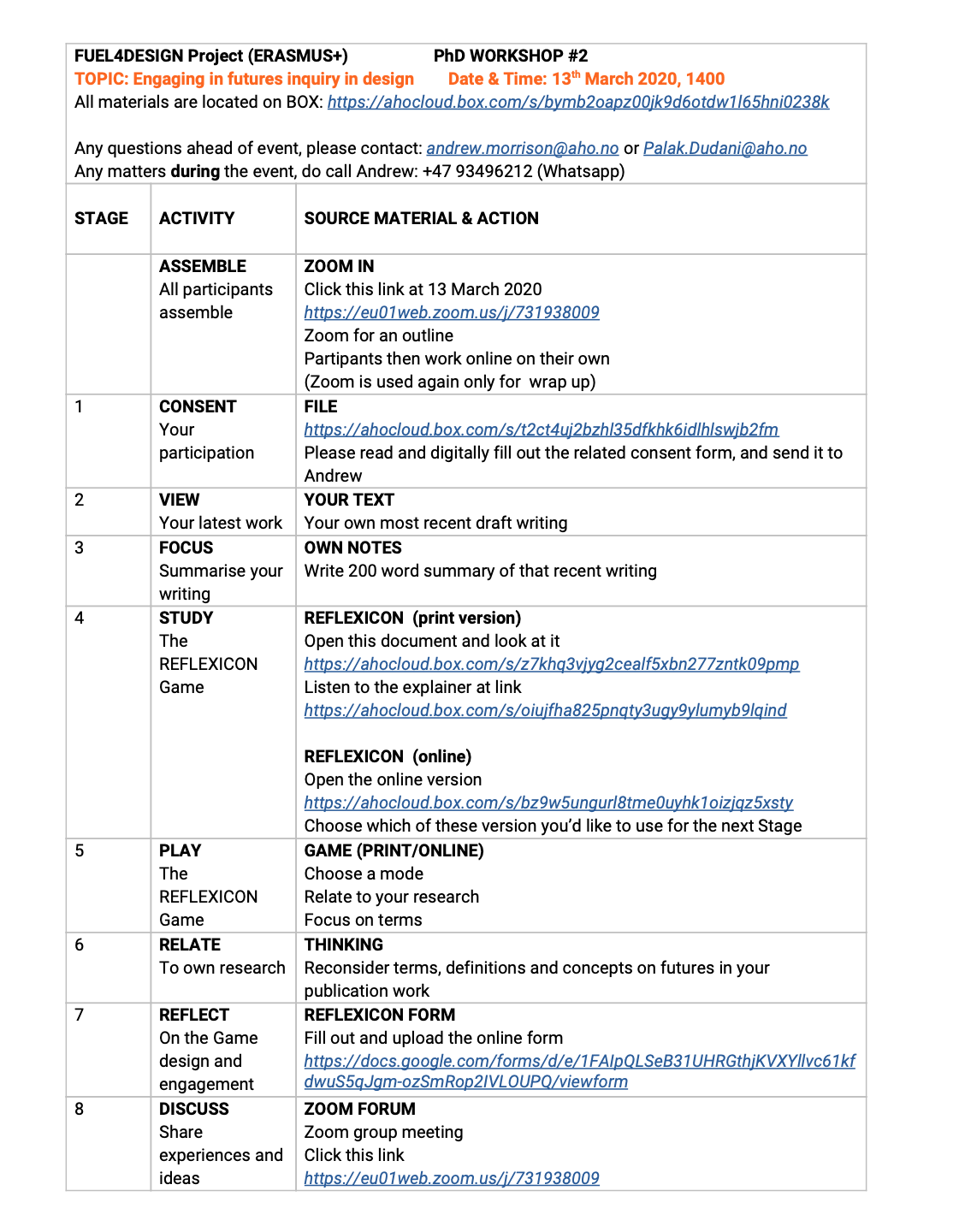
A screenshot of the google document used to structure and facilitate the project’s first online and completely synchronous workshop.
The REFLEXICON was initially designed as a card game for individual or group use in a face to face event. After the lockdown, the The REFLEXICON was redesigned into an interactive digital game, reusing card game-based codes to help explorations with the content or words of Lexicon in a reflexive way. In order to make it possible to play the game in both physical and digital settings, the REFLEXICON page now contains both a print-ready PDF version of the cards and the digital interactive version for online play.
Engaging in Futures Enquiry in Design, PhD Workshop #2. REFLEXICON
AHO, 13 March 2020
Teachers and facilitators: Andrew Morrison & Palak Dudani
The REFLEXICON workshop was planned as a digital synchronous workshop and conducted over zoom. In order to facilitate the workshop remotely, supporting material such as the digital interactive tool and a video tutorial were designed. The participants also had the option to share their feedback using the feedback form.
The workshop was designed with PhD students in mind. The aim of the workshop was to introduce the students to a design game as a way to question how futures design words work. The game play also encourages students to connect critical reflection and reflexive review as part of their design research practice.
In this post we share how we participants played the REFLEXICON game and their reflections on how it supported them in their design research work.
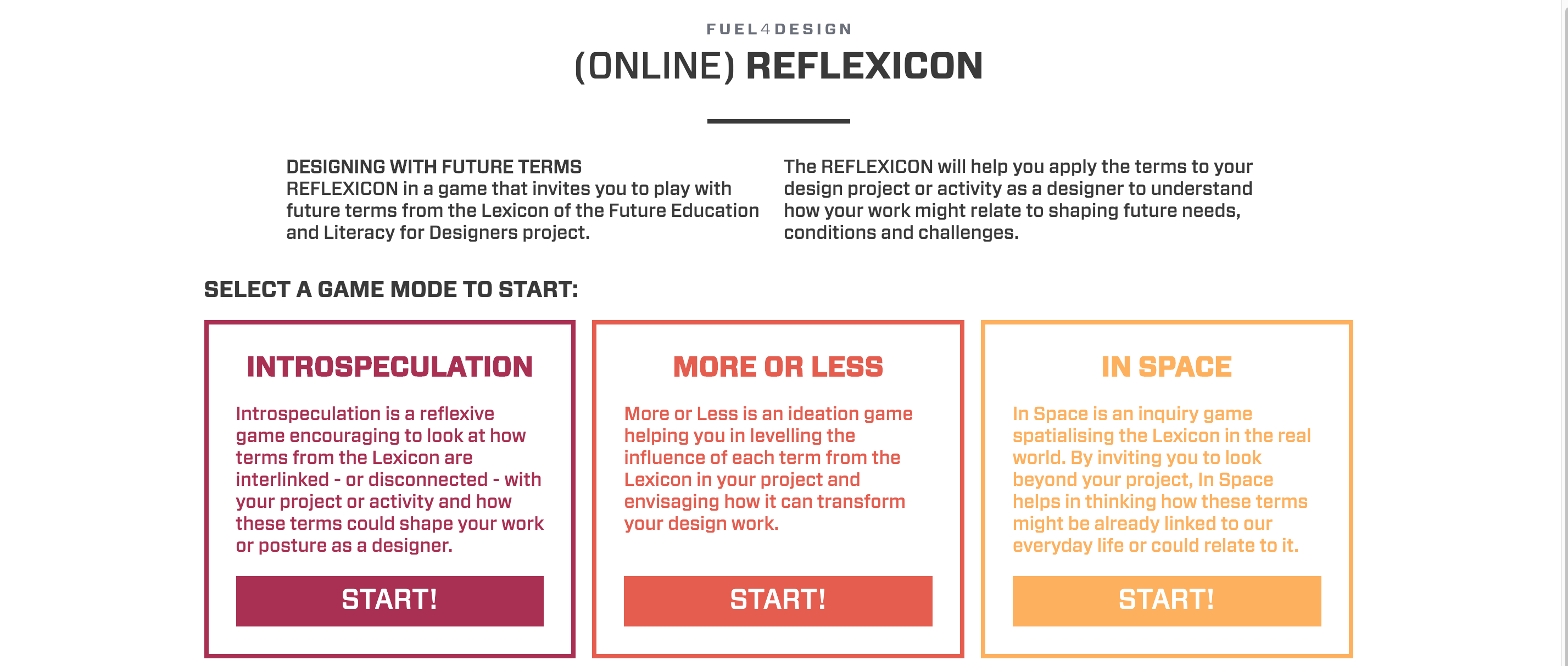
Screenshot of the REFLEXICON digital interactive tool
Within the workshop, the participants are encouraged to have a short write up of their project before they can begin playing the REFLEXICON. The participants start with the video tutorial to understand the rules and instructions. The RELFEXICON has three game modes and participants can attempt them in any order.
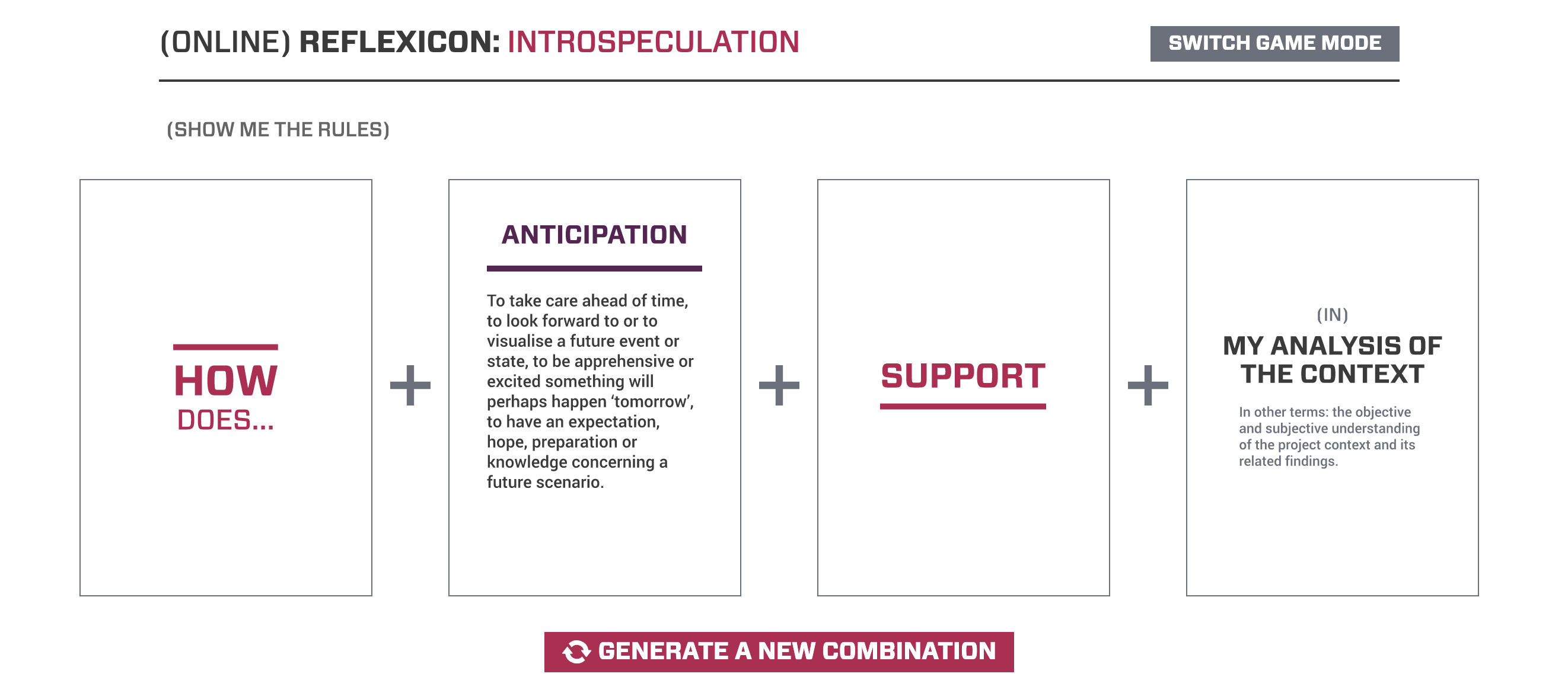
Screenshot of the game mode Introspeculation of REFLEXICON digital interactive tool
Game Mode #1: Introspeculation
The Introspeculation game mode encourages designers to look at how terms from the Lexicon are interlinked – or disconnected – with their project or activity, and how these terms could shape their work or posture as a designer. It prompts players to reflect on the question generated and speculate on how it could be different. Players can iterate by reloading the combination to push the introspection further.
One of the PhD student participants found the combinatorial aspect of the terms interesting saying that “it sharpened my critique of different words”. Another mentioned that they found this game mode “highly relevant” for their work, one of them expressing that “[it helped me] create perspectives on my article/ work”.
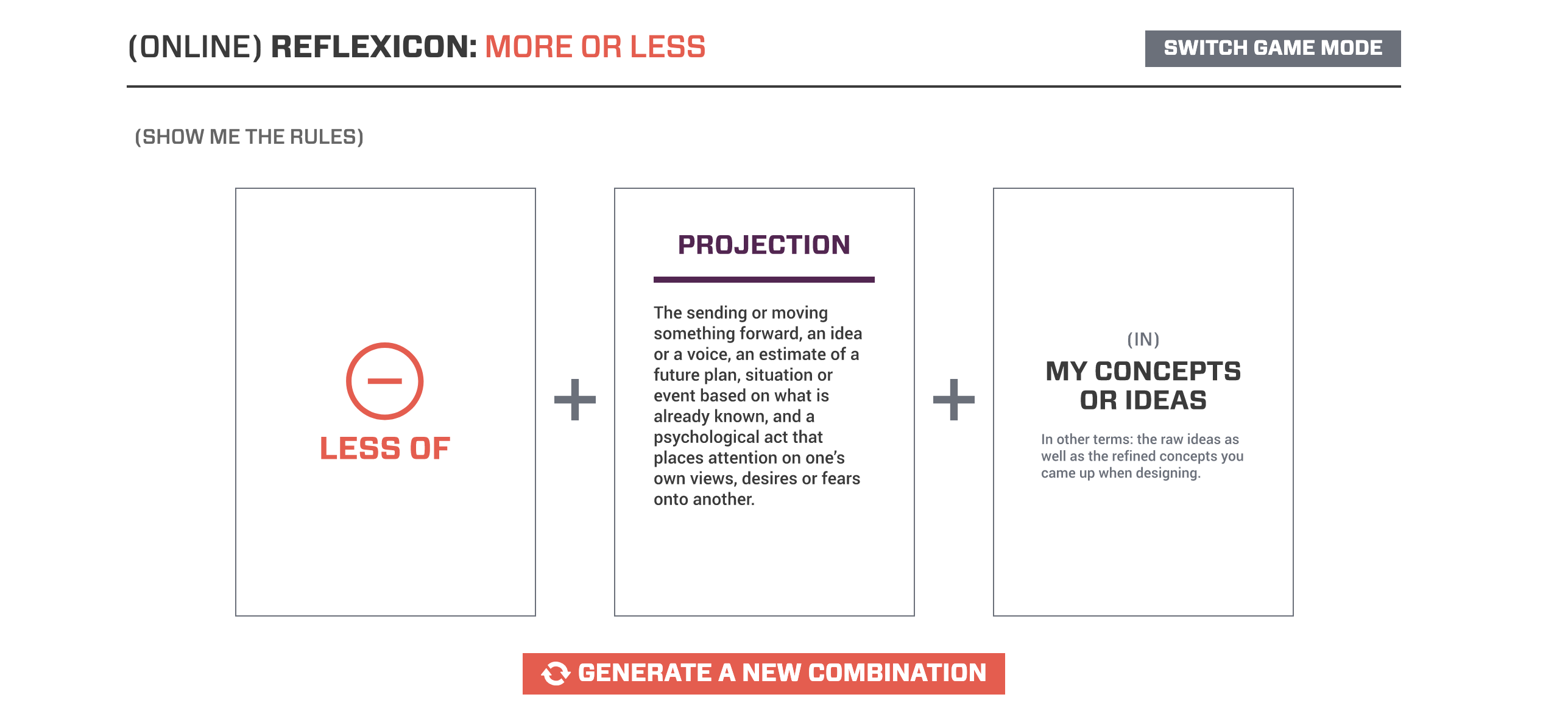
Screenshot of the game mode ‘more or less’ of REFLEXICON digital interactive tool
Game Mode #2: More or Less
More or Less is an ideation game mode, helping designers in levelling the influence of each term from the Lexicon in their project and envisaging how it can transform their design work.
It prompts players to imagine what more or less of this term might change for their practice or their work.
While playing this game mode, PhD students reflected: “when we say more ‘speculative’ does that mean being less critical?” They felt that it was “helpful for me to think about my research in a different way and I can see different things I can not see before the workshop.”
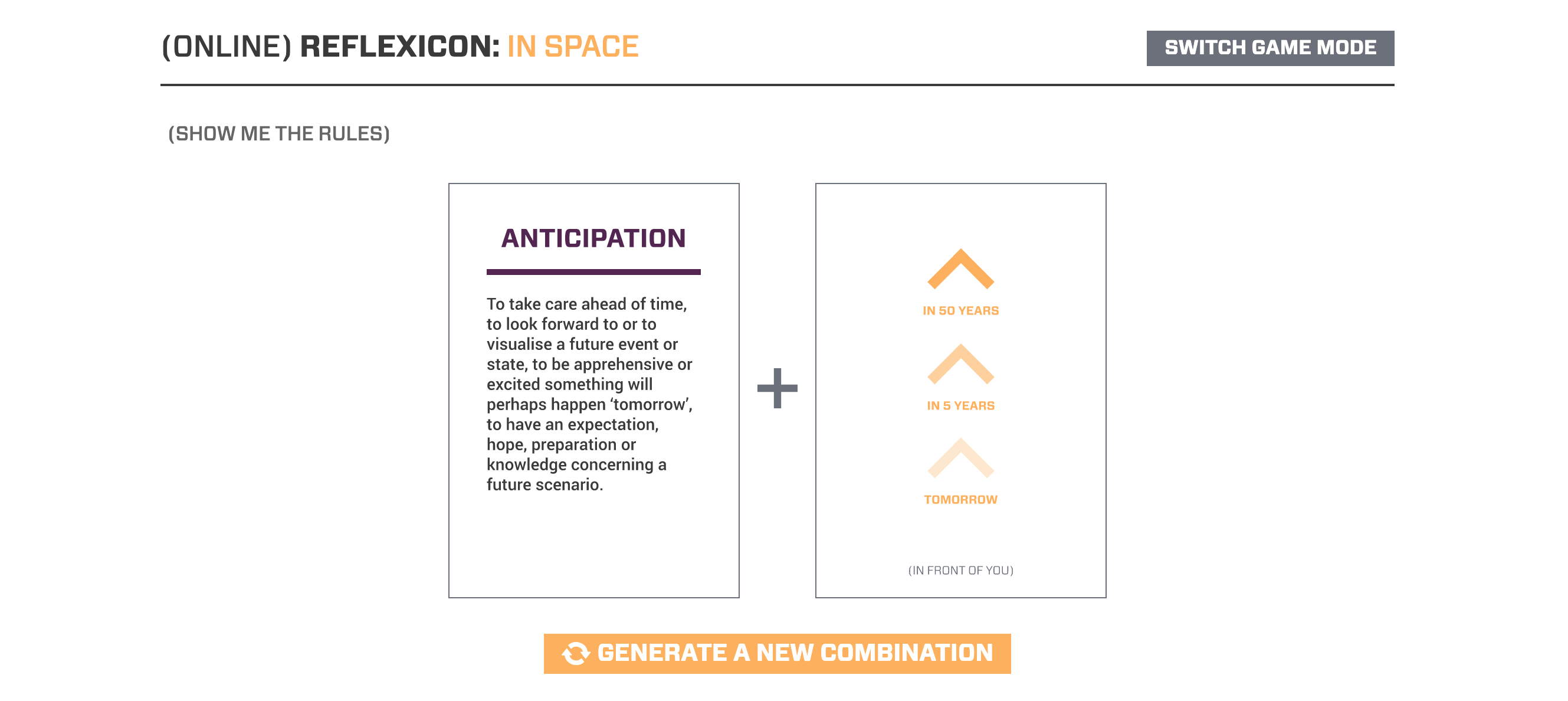
Screenshot of the game mode In Space of REFLEXICON digital interactive tool
Game Mode #3: In Space
The In Space game mode is an inquiry game spatialising the Lexicon in the real world. By inviting designers to look beyond their project, In Space helps in thinking how these terms might be already linked to our everyday life or could relate to it.
The instructions say
Look at what the arrow card is pointing to. Consider the whole environment or a specific element being pointed. Reflect on how the term could be linked to what the arrow is pointing to and might evolve tomorrow, in time.
During feedback discussions, one of the PhD student participants felt that ‘space game [mode] is very helpful for creating scenarios’ while another said that ‘it builds a connection with reality’. A PhD student who’s looking at the role culture within service design reflected how ‘the mode helped me to think more about the change and development of a specific term, which can push me to imagine the relationship between a term’s present and the future.’
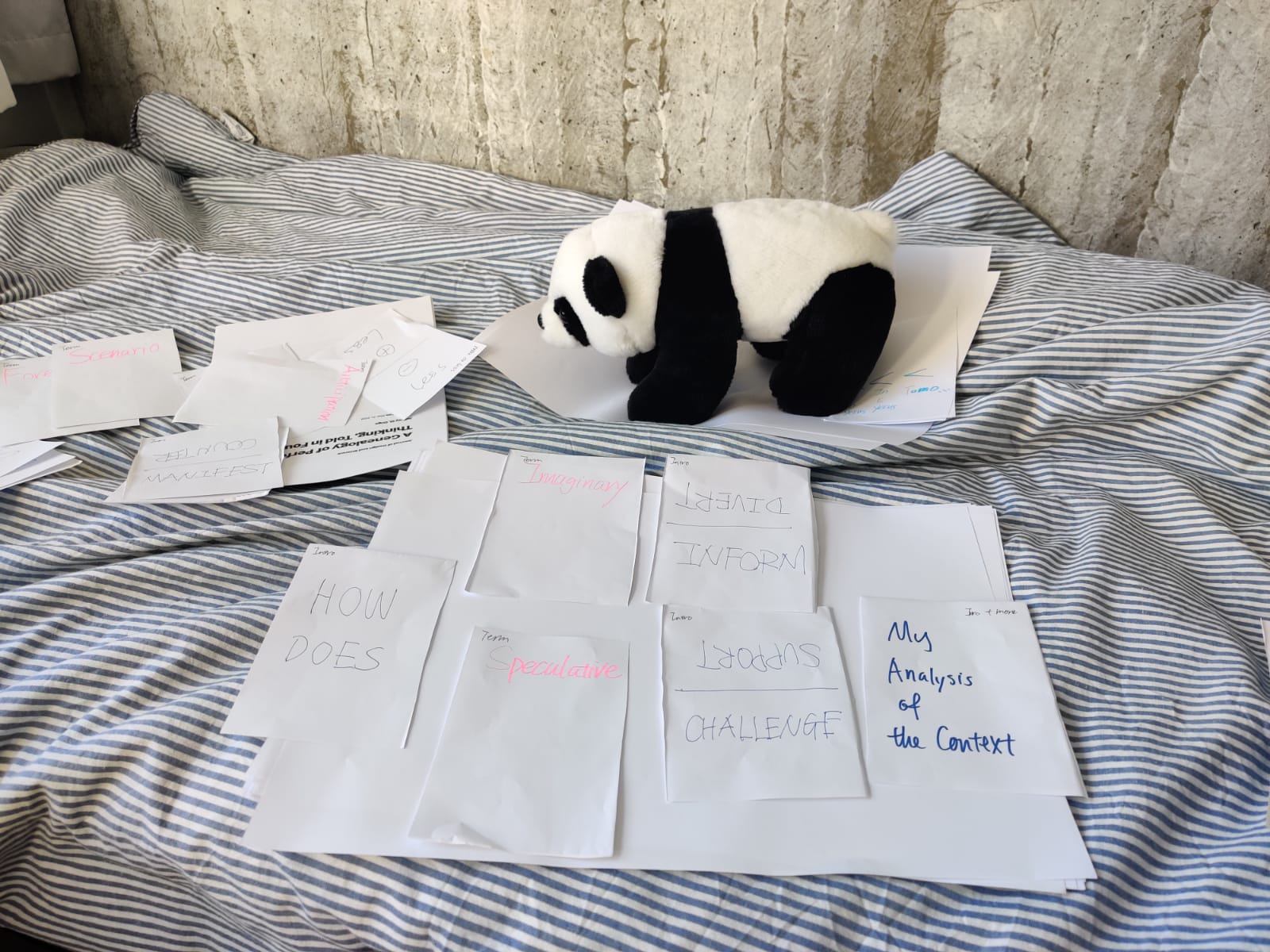
A PhD student participant sharing their notes on how they used the physical card game in a digital remote workshop setting. Photo Yue Zou
Discussion and reflections
The PhD participants described playing the REFLEXICON as ‘doodling with words, like a creative method for understanding and issue-making’, and as a ‘a way to expand my thought and encourage me to think about the details of my research’.
What words do the most work for us? When we define words for ourselves, they’re tied to the core concepts we’re going to use. At that time, we have to strike a balance such that the words are general enough to be understood but specific enough for our work (within the discipline we are).
The PhD students reflected on the use of words, and how ‘words hold different meanings in different disciplines. When working with words, there are questions one has to ask oneself. The game is set-up in a good way to support that.’ Another mentioned the role of words in supporting ‘imagination’ and ‘if you have a word for it, you can think about it’. Going deeper in the use of specific words, one of the participants chose ‘inter-factual’ and said ‘it sharpened my argument on what role it plays in the process as designer.’ Another participant chose ‘reflexivity’ saying how it helps them question the role of ‘reflexivity (and how it) informs the process of my research, it’s significance in my research. What am I doing differently from others and why is it important? We used the terms ‘less’ and ‘more’, it’s a dualistic idea but in my project I have multiple views.’
Prof Amanda Steggell, a choreographer from Oslo National Academy of the Arts attended the REFLEXICON workshop and noted:
… the instructions of the game appear to be more fluid. For example, the terms, as described, challenge participants/users to find/discover/discuss other descriptions of the terms, more situated in their specific projects, more than less, suited and situated in the world. And not in the least, the lexicon and game can be shared, appropriated, reconfigured and expanded in different ways and means.